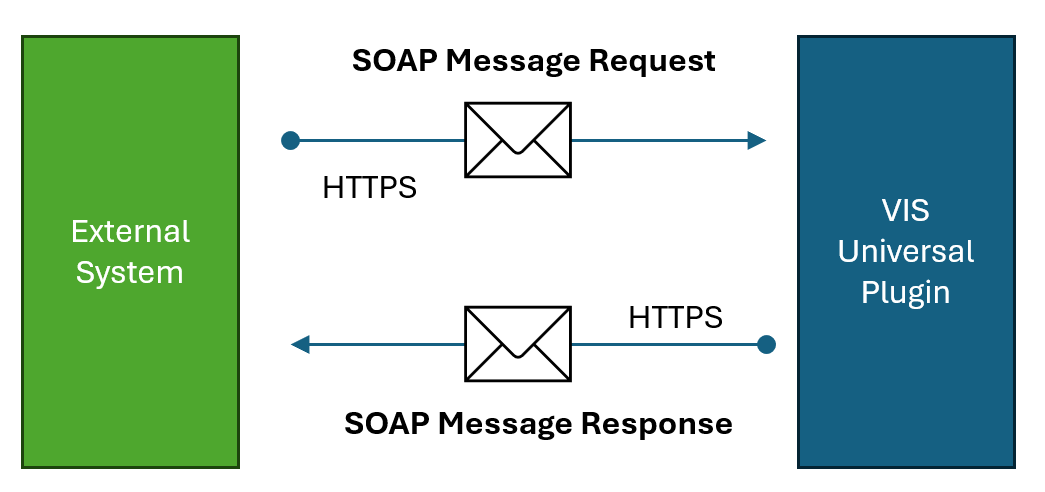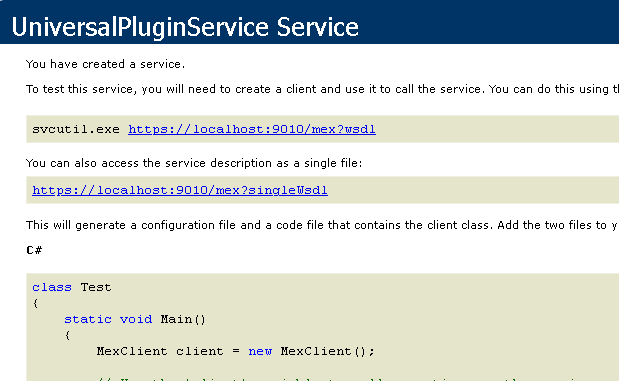The Universal plugin provides a standardized interface to the Vienna Test System (VTS), enabling:
-
Person management (creation, updating, searching and sending invitations for an online test)
-
Export of test results in PDF, CSV and SPSS formats
-
Various other operations such as the retrieval of test status or triggering an archiving operation
Communication is handled via a SOAP 1.2 Web Service, ensuring compatibility with open standards and integration flexibility.
Overview of functionality
SOAP (Simple Object Access Protocol) is a standard for sending messages between systems and applications. It offers a reliable way to exchange information. The Universal plugin includes a SOAP web service that supports different message types, allowing external systems to control the VTS or get data from it. Although SOAP supports various transport methods, the Universal plugin uses only HTTPS for communication.
The Universal plugin web service is passive, meaning it only reacts to incoming messages. It does not initiate any communication on its own and relies entirely on external systems to send requests or commands.

Authentication
The Universal plugin requires WS-Security authentication using a UsernameToken over HTTPS. All SOAP requests must be sent over a secure HTTPS connection, and the WS-Security header must include a UsernameToken containing the valid username and password. No client certificates are required. When testing with tools like SoapUI, ensure that WS-Security is enabled with UsernameToken, and set the password type to either plain text (PasswordText), as required by your environment. Username and password for authentication are configured in the plugin config file, see also Universal plugin - UP VIS Settings file.
Setup and configuration
In order for the SOAP web service to be available, the Universal plugin must be configured in the VIS settings file. By default, the plugin listens to port 9010. If this port is unavailable or already in use by another application, it can be easily changed within the configuration file.
Here is a short step by step guide on how to configure a minimal working setup. For advanced options please refer to the sections below.
1. Adapt the VIS settings file
The Universal plugin must be enabled and configured in the VIS settings file by default located in C:\Program Files\SCHUHFRIED GmbH\Vienna Test System 8\IntegrationService\appsettings.json
Note: This is the default installation path. If the Vienna Test System was installed to a different location, the actual path may vary accordingly.
This file contains the configuration of all available VIS plugins. All settings relevant to the Universal plugin can be found under the section starting with “UniversalPlugin”.
"UniversalPlugin": {
//...
}
1.1. Enable the Universal plugin
In order to use the Universal plugin, ensure the value of the Enabled property is set to true (it is enabled by default).
"Enabled": "true",
1.2. (Optional) Configure a custom port
If a port different to the standard one shall be used to listen to incoming requests, it needs to be changed in a setting named “Urls”, outside of the section “UniversalPlugin”.
"Urls": "https://localhost:9010",
1.3. Apply changes
![]()
2. Test your setup
2.1. Verify service operation
To confirm that the Universal plugin is running correctly, open a web browser and navigate to the plugin’s Metadata Exchange (MEX) endpoint:
https://[machineName]:[port]/mex
For example, if running locally on the default port:
https://localhost:9010/mex
This endpoint provides metadata about the service and should be accessible if the plugin is properly configured and operational. The following screenshot shows how it should look like in the web browser:

Please note that the “singleWsdl” endpoint does not work due to legacy reasons (namespace collisions that cannot be resolved in order to maintain compatibility).
2.2. Samples
A sample project can be downloaded from the following link: https://dev.azure.com/SchuhfriedGmbh/SchuhfriedPublic/_git/VisSamples.
Consider reading the project’s README.md before running it.
2.3. Troubleshooting
In all cases, you may check the log files for any hints about what could be wrong (see: Universal plugin - Logging )
-
The MEX service endpoint cannot be reached in browser
-
A firewall may block incoming connections to the configured port. Ensure that incoming connections on the specified port are accepted.
-
Verify that the configured port matches the port used in the URL
-
Ensure the “WTS Service” has been restarted and all settings are correctly applied
-
-
Messages are terminated with 401 or 403 HTTP status codes
-
Ensure that messages are properly authenticated (see above)
-
-
Messages are terminated with error status codes
-
Ensure that there are no inconsistencies in your data, e.g. malformed fields or a reference to a non-existing test battery.
-
Check the logs for information about possible issues.
-
Further information and reference
The following sections contain more detailed information about the various topics related to the Universal plugin and its functionality.
VIS settings file
The Universal plugin must be enabled and configured in the settings file of the VIS by default located in C:\Program Files\SCHUHFRIED GmbH\Vienna Test System 8\IntegrationService\appsettings.json
Note: This is the default installation path. If the Vienna Test System was installed to a different location, the actual path may vary accordingly.
This file contains the configuration of all available VIS plugins. All settings relevant to the Universal plugin can be found under the section starting with “UniversalPlugin”.
Settings reference
|
Field |
Description |
Note |
|---|---|---|
|
URL and port under which is plugin running |
Modify only if needed. |
|
Defines if the plugin is enabled and should be started. |
Must be set to |
|
Default test battery for direct testing used for the imported persons in case test battery is not provided in the call to create new person. |
Modify only if needed. |
|
Type of identification of the certificate in the communication with the plugin. |
Modify only if needed. |
|
Identification of the certificate used in the communication with the plugin. |
Modify only if needed. |
|
The expected username that clients must provide in the WS-Security |
Must be configured. |
|
The password associated with the specified username. This value must match the password included in the WS-Security |
Must be configured. |
|
Specifies multi-client (e.g. V12345_001) where plugin performs actions. |
Must be configured. |
|
Language used for the imported persons. |
Must be configured. Language code in BCP 47 format. E.g. de-DE for German, en-US for English. |
Example
Interface description
A complete description of the interface is available in the WSDL file available via the interface’s Metadata Exchange (MEX) endpoint (https://[machineName]:[port]/mex).
Below is a summary of the available endpoints:
Endpoints
|
Name |
URL |
|---|---|
|
IUniversalPluginService |
|
|
IUniversalPluginServiceStreamed |
|
|
IUniversalPluginSpecialCaseService |
|
|
IMex |
|
IMex interface
|
Operation name |
Description |
|---|---|
|
Ping |
Ping endpoint to verify functionality of the plugin. Can be called without authentication. |
IUniversalPluginService operations
|
Operation name |
Description |
|---|---|
|
GetCandidate |
Returns data for a single person. |
|
GetAllCandidates |
Returns data for all persons in the database. |
|
AddCandidate |
Creates new person in the VTS database. |
|
UpdateCandidate |
Updates existing person. |
|
DeleteCandidate |
Deletes one person. |
|
DeleteCandidates |
Deletes multiple persons. |
|
DeleteAllTestResults |
Deletes results of specified persons. |
|
GetInvitationLink |
Creates new person and generates invitation link for online testing. |
|
GetResultIDsForCandidate |
Returns IDs of all results for a person. |
|
GetVariableValuesForResult |
Returns values of specified test variables from a test result. |
|
GetResultAsSPSS |
Returns test result exported in SPSS format. |
|
GetControlMonitorEntries |
Returns data from active test sessions currently in progress for individual machine. |
|
GetControlMonitorEntriesUsingDepartmentFeature |
Returns data from active test sessions currently in progress for individual machine filtered by department of the test person. |
|
StartArchive |
Triggers archiving process. |
IUniversalPluginServiceStreamed operations
|
Operation name |
Description |
|---|---|
|
ImportTestResults (deprecated) |
Deprecated - may be removed in a future version. |
|
GetResultAsPDF |
Returns test result exported in PDF format. |
|
GetResultAsCSV |
Returns test result exported in CSV format. |
|
GetWordReportAsPDF (deprecated) |
Deprecated - may be removed in a future version. |
IUniversalPluginSpecialCaseService operations
|
Operation name |
Description |
|---|---|
|
GetTestProtocol (deprecated) |
Deprecated - may be removed in a future version. |
|
GetFitValue (deprecated) |
Deprecated - may be removed in a future version. |
|
GetTotalPresentedItemsCount (deprecated) |
Deprecated - may be removed in a future version. |
|
AddCandidates (deprecated) |
Deprecated - may be removed in a future version. |
Data types
The data types used in the available operations are specified in the WSDL document. The names of the fields should be self-explanatory.
Logging
The VIS and Universal plugin generate log data that can be used to analyze their functionality. This data is recorded in the following log files:
C:\ProgramData\Schuhfried\Logs\VTS.Integration.Service.log